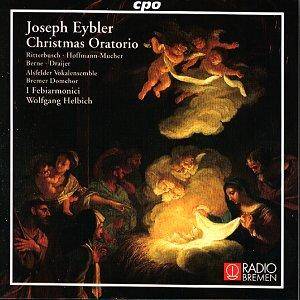
Joseph Eybler was a Viennese composer of the late 18th and 19th centuries.
He was a pupil of Johan Georg Albrechtsberger (as were Hummel and Beethoven),
and was a respected friend of Mozart and Haydn. He is believed to have had
a close involvement with the composing and posthumous completion of Mozart's
"Requiem". His Christmas Oratorio "The Shepherds at the Crib in Bethlehem"
was his his first major choral work at the age of 29. Its musical style is
a synergistic blend of "late baroque" elements (no doubt imbibed from his
traditionalist mentor Albrechtsberger) together with the then modern style
developed by Haydn and Mozart. Listeners can be grateful to the conductor
of this performance, Wolfgang Helbich (Director of Music at Saint Peter's
Cathedral in Bremen), whose resaerches have rescued this entrancing work
from undesereved obscurity.
The overture open with dark and sombre chords in the minor key, reflecting
the shepherds' apprehension and awe on approaching the manger in Bethlehem,
but the predominant emotion of the whole work is one of undiluted joy and
exultation, alternating with movements of serene contemplation. Certain movements
call for special mention: No.4, "Das Kind strecht seinen Arm", contains woodwind
playing, especially the melifluous flute obbligato, which forms perfect ensemble
with the contralto voice of Waltraud Hoffman-Mucher. No.8, "Er ist's, Gott
selbst in Fleischeshulle", and No.16, "Er ist in Bethlehem geboren" are bravura
arias for soprano (Sabine Ritterbusch) and bass (Jelle Draijer) respectively,
which would merit honourable places in Mozart opera or Haydn oratorio, with
exhilarating brass and tympani which Helbich lets fly with unrestrained vigour.
The pastorale music, obligatory in 18th century Christmas music, is here
provided in the final chorus of Part 1: "Euch ward er geboren" by a particularly
robust Chorus of Angels; serene it is, to be sure, but saccharin sentimentality
is conspicuously absent.
The finale of the whole work, "Gott sey Ehre in der Hohe", is truly a Gloria
in Excelsis of a chorus, set in triple time and performed at a
tempo for which "scherzo" is the only possible description. What makes this
performance so stimulating and high impact is the uninhibited enthusiasm
of the orchestra, soloists and chorus alike, who so brilliantly do service
to Helbich's lively, but never rushed, tempi. At the same time, much careful
preparation must have gone into the vocal/instrumental and the
strings/woodwind/brass & percussion balances, together with extremes
of dynamic range, which the recording puts over with full force. This must
be an exhilarating work to perform in. Choral societies seeking a shorter
work than Handel's "Messiah" or Bach's "Christmas Oratorio" could do well
to consider Eybler's work for Christmas performance. Even the final chorus
alone would be a fitting climax to any Christmas concert.
Reviewer
Humphrey Smith


